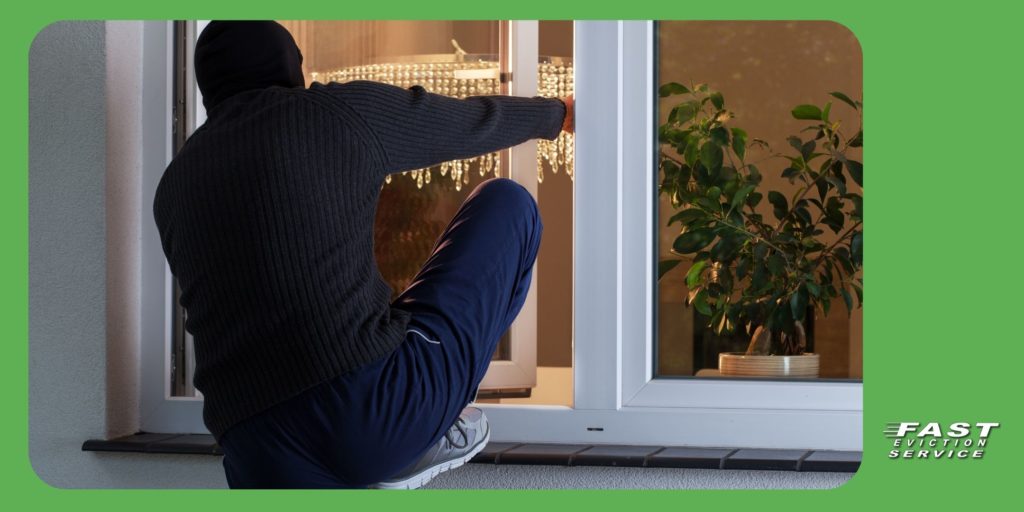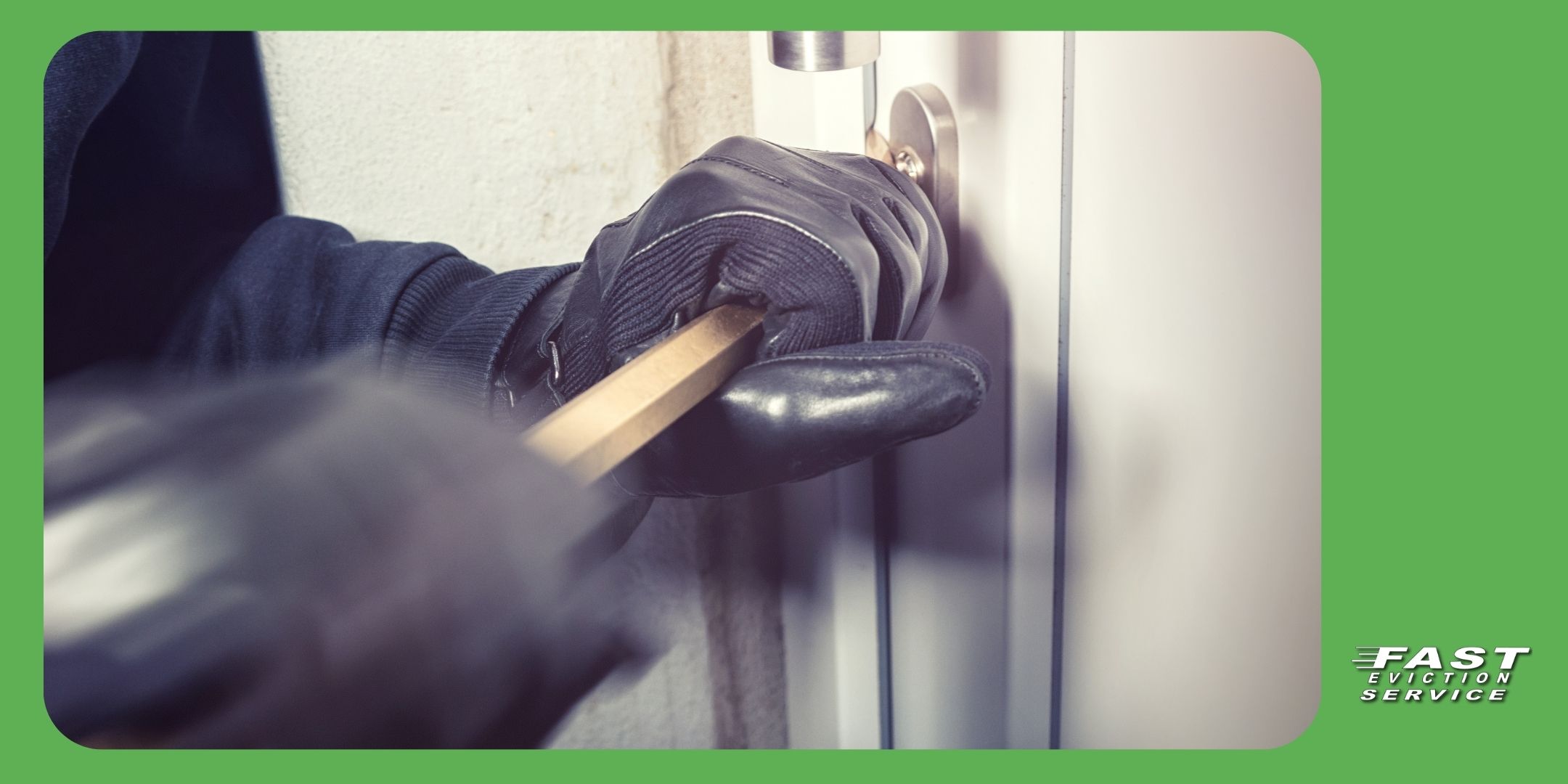Updated 12/11/24
It’s every landlord’s nightmare come true. You get a call from a tenant who is obviously very shaken and upset, saying their rental unit has been broken into. Apart from the loss of valuables which can be significant and may or may not be replaceable, it’s usually one of the most traumatic experiences in someone’s life having their personal living space broken into.

It’s important to understand that trauma – which is the psychological result of a deep wounding of people trying to put themselves back together and make themselves whole again – can intrude into a person’s consciousness and feel like it is controlling them rather than them feeling they are in control. It is to be expected this can feel overwhelming for the tenant, and can last far longer than the event.
This is why it is so important for a landlord to know how to take the proper steps if this unfortunate call ever comes and know how to deal with a burglary on your rental property – including both the legal responsibilities and liabilities under California Law for the landlord – as well as the psychological and financial impact on the tenant.
First Immediate Responses
If the tenant calls you first, tell them not to enter the rental unit and call 911 immediately.
This is when most people’s emotions are usually running high, and many people’s first inclination is to enter the unit in hopes of catching and stopping the perpetrator – which can be very dangerous. The risk of adding personal injury to financial loss isn’t worth it. Tell them to put their personal safety first and leave that to the authorities.
Another natural inclination is to start cleaning up any messes the burglar made emptying drawers or smashing windows. Tell them not to touch anything. Leave everything as is for the authorities to do their investigation without disturbing the evidence.
It’s very important to convey authentic empathy to the tenant that you understand how upsetting this is. That you will do everything you can to help them that you – “as the landlord is legally responsible for” – to help them recover from this loss.
It’s important to include this mention of what the “landlord is legally responsible for” because that probably will not be completely clear at the moment the burglary is reported. This helps convey empathy and your good faith effort to help them in the moment, but also protects you until more facts are known from liability being unfairly placed upon the landlord until the police investigates.
At this point, do not express any specific responsibilities until the police have had a chance to investigate and establish the facts of the break-in and file a report. Otherwise, speaking prematurely may set up future liabilities for the landlord and lawsuits under California Law.
Next, contact neighbors immediately to find out if they saw anything suspicious while their memory is fresh and to warn them of a possible threat on the property or the neighborhood.
Call Insurance Companies
Once the immediate threat is dealt with and neighbors are contacted the next step is for both the tenant and the landlord to contact their insurance companies.
This is one of the most important reasons to have tenants carry renter’s insurance because in most instances it will be the only way they are able to recover their financial losses. Do this within thirty minutes to an hour of the time you received notice of the break-in.
It’s important for everyone involved to double-check their coverage and expiration dates of their policies. Hopefully, the tenant would have followed their renter’s insurance companies guidelines and had photos of anything worth more than $200 and receipts of big ticket items.
Repair any Broken Windows or Doors
There are some landlord responsibilities after burglary to consider.
Related: Your Responsibilities as a Property Owner
If the break-in was a forced entry with windows or the door broken, you need to fix those immediately. You can’t expect anyone to live in a rental unit that can’t be secured – especially one that was just broken into.
A landlord must provide a safe place for tenants to live to honor the implied warranty of habitability that is part of the rental or lease agreement whether it is in writing or not. If the rental is not repaired quickly making it safe and habitable, the landlord may be liable in a lawsuit under California Law.
Secure the Area
It’s important in this situation while tenant’s nerves are still raw to see to their reasonable requests for safety. While a landlord is not required to install a burglar alarm or surveillance cameras – either real cameras or cheaper fake cameras that fool burglars – you may consider installing these if it will help make the tenant feel safe to keep them if they are a good tenant.
Related: How To Make Your Property Safe For Yourself And Your Tenants
Motion sensor lights that keep areas lit, and upkeep on the landscaping to make sure there’s no place burglars can hide also helps. If a porch light is broken, fix it. Do periodic property inspections to make sure everything is properly being maintained.
Other safety features include deadbolt locks and window locks. Outline the safety steps you are taking, or detail the safety steps you have taken in the lease agreement to be certain the tenant is aware of them.
A basic rule of thumb is to study what measures other landlords in your area are taking and meet or exceed them on your own property.
Questions Your Tenant May Ask
Is the Landlord Going to Pay for My Stolen Property?
Whether or not a landlord is liable for their tenant’s losses from a burglary depend upon the exact circumstances under California Law – but probably not so long as the landlord has practiced due diligence.
In most instances, the tenant’s renter’s insurance will cover that – and is one of the most important reasons landlords should require tenants to carry renter’s insurance. Your rental or lease agreement should also contain language about whose liability it is if a break-in occurs on the property, enabling the landlord to be able to point to the agreement they signed to answer this question.
However, there are circumstances under California Law where a landlord is liable for damages from break-ins if it can be proven the landlord did not exercise due care – for example in maintaining common areas, or in taking proactive security measures that a reasonable landlord would take like making sure locks work properly.
If doors or window locks don’t work properly and the tenant informed the landlord of this and the defect was not corrected, the landlord could be liable for damages. Or if the tenant lost their keys, informed the landlord and the landlord didn’t replace the lock the landlord could be liable.
However, if a tenant lost a key, didn’t inform the landlord or gave a key to a friend and there was no evidence of forced entry, then it can be assumed the key was used to gain access.
If the break-in was obviously a forced entry then the landlord is not liable.
These are some of the reasons the landlord should not make any promises to the tenant regarding what they are responsible for until the police investigate and the facts of the matter are established – which are usually not clear at the time the burglary is reported.
Can I Break My Lease and Move Out?
Here it’s important for the landlord to understand how trauma works – how it can intrude into a person’s consciousness and feel overwhelming like it is controlling the person rather than them being in control. That’s a natural result of trauma.
A landlord can do everything in their power to try to make a tenant feel safe like installing security cameras, additional lighting and deadbolt locks – and the tenant still doesn’t feel safe and wants to break the lease early and leave.
Emotions are subjective, and just because a person doesn’t feel safe doesn’t actually mean they are in danger. However, this is a tricky situation for the landlord and flexibility in how to respond is important.
The tenant is responsible for paying rent for the remainder of the lease period, or until the landlord can find another tenant. But ask yourself, do you really want a tenant on your property who feels unsafe and doesn’t want to be there?
The tenant may leave and bring a lawsuit against you for failure to provide the implied warranty of habitability if they have asked for additional security measures the landlord has not provided. How that will play in court would probably decide upon the judge hearing the case.
But do you want to possibly incur legal costs with a tenant you know has been hurt by a break-in if they decide to go this route? Always best to try to work with the tenant particularly if you know they are genuinely scared as letting them out of the lease may ultimately save you money and more headaches.
Unhappy tenants make for unhappy landlords!
What if a Tenant in a Nearby Unit now Feel Unsafe and Wants to Break Their Lease?
They probably cannot legally get out of their lease. However, if crime is increasing in your area, it is important for a landlord to be able to show they are also increasing their security measures to meet that threat or possibly face problems.
Related: A Landlord’s Duty: Safety and Habitability Regulations Required for Their Tenants
Can I sue my landlord for stolen property?
A tenant can sue their landlord for stolen property if the theft resulted from the landlord’s negligence. For example, if the landlord failed to repair a broken lock or secure common areas, the tenant might have a case. The lease agreement and local laws can also affect the tenant’s ability to sue, as these documents and regulations outline the landlord’s responsibilities regarding property security. Filing a police report and having evidence that the landlord was aware of security issues can support the tenant’s claim.
However, tenants are generally responsible for insuring their personal property through renter’s insurance, which might cover the loss. If the tenant’s insurance does not cover the theft or they do not have insurance, they might consider filing a claim in small claims court if the stolen property’s value is within the court’s limits. Consulting with a landlord-tenant attorney can provide guidance on the best course of action and the likelihood of a successful lawsuit.
Retrieving Stolen Property
Still another way a landlord can show authentic empathy is to help the tenants know what steps they can take to try to recover their property.
Searching local pawn shops is one way to try to recover stolen property. California requires anyone bringing property to a pawn shop for money to present ID. If the renter has photos of their property and have reported it stolen, it is relatively easy to get their property back as most pawn shops want to fully comply with law enforcement in this way.
More frequently in the 21st Century, Craigslist and other online classified ads is the more common way thieves unload stolen property. If anything is found searching these sites that matches the description of the stolen property, report it to the police department who investigated the break-in to hopefully get the goods returned.
Summary
It’s always in the landlord’s best interest to make certain your rental property is as secure and safe as possible. If a tenant is injured during a break-in in progress, the damages can run much, much higher that depending upon the circumstances a court may order the landlord responsible for. This is particularly true if there is a history of previous break-ins on the property.
Dealing with a break-in professionally and with compassion will do much to build trust with your tenants and improve the security and well being on your property as a whole. The preparation you’ve made before the break-in occurs will do much to mitigate the damages and hurt should a burglary occur. This includes having a clause in your rental or lease agreement covering burglaries and rental insurance, educating your tenants to having photos and receipts of big tick items, realistically assessing the crime situation in your neighborhood, meeting or exceeding standard safety measures to secure the property, doing regular inspections to make sure everything like locks and lights are working properly, responding to any tenant security concerns, and educating tenants what actions they should be taking to keep the area secure will all do much greatly reduce and hopefully stop break-ins on your property and keep the landlord’s responsibility under California Law to a minimum.








